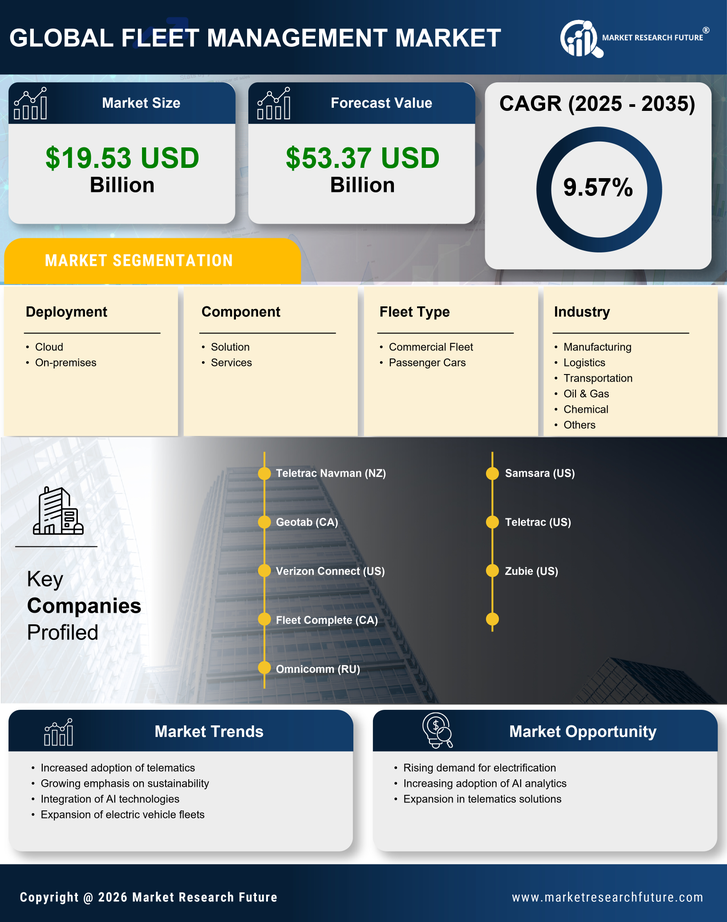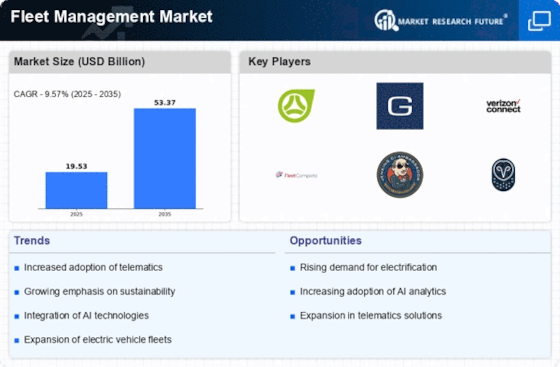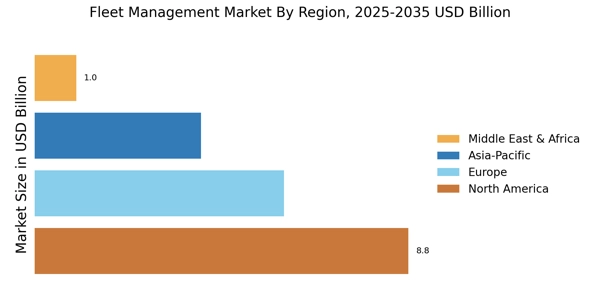Emphasis on Regulatory Compliance
Regulatory compliance is an essential driver influencing the Fleet Management Market. Governments worldwide are implementing stringent regulations regarding vehicle emissions, safety standards, and driver qualifications. Compliance with these regulations is not only a legal obligation but also a means to enhance corporate reputation. Fleet operators are increasingly investing in technologies that ensure adherence to these regulations, such as electronic logging devices and emissions monitoring systems. The market for compliance-related fleet management solutions is projected to grow significantly, as companies seek to avoid penalties and enhance operational transparency. This emphasis on regulatory compliance is likely to shape the future landscape of the Fleet Management Market.
Rising Demand for Cost Efficiency
Cost efficiency remains a central concern for businesses operating within the Fleet Management Market. Companies are increasingly seeking ways to minimize operational expenses while maximizing productivity. The implementation of fleet management software can streamline processes, reduce fuel consumption, and optimize route planning. Reports indicate that organizations that adopt comprehensive fleet management solutions can reduce their overall fleet costs by approximately 20%. This drive towards cost efficiency is further fueled by the competitive nature of the market, where companies must balance profitability with service quality. As such, the focus on cost-effective fleet management practices is expected to persist, shaping the strategies of businesses in the Fleet Management Market.
Integration of Telematics Solutions
The integration of telematics solutions is a pivotal driver in the Fleet Management Market. Telematics technology enables real-time tracking of vehicles, providing fleet operators with critical data on vehicle location, speed, and fuel consumption. This data can lead to improved operational efficiency and reduced costs. According to recent statistics, fleets utilizing telematics can achieve fuel savings of up to 15%. Furthermore, the ability to monitor driver behavior through telematics can enhance safety and reduce accident rates. As the demand for data-driven decision-making increases, telematics solutions are likely to become indispensable in the Fleet Management Market, facilitating better resource allocation and maintenance scheduling.
Adoption of Electric and Alternative Fuel Vehicles
The shift towards electric and alternative fuel vehicles is transforming the Fleet Management Market. As environmental concerns gain prominence, businesses are exploring sustainable transportation options. The adoption of electric vehicles (EVs) can lead to substantial reductions in greenhouse gas emissions and fuel costs. Recent data suggests that fleets incorporating EVs can reduce their fuel expenses by up to 70% compared to traditional vehicles. Additionally, government incentives for electric vehicle adoption are encouraging fleet operators to transition to greener alternatives. This trend not only aligns with corporate sustainability goals but also positions companies favorably in a market increasingly focused on environmental responsibility. The growing presence of electric and alternative fuel vehicles is expected to significantly influence the Fleet Management Market.
Technological Advancements in Fleet Management Software
Technological advancements in fleet management software are driving innovation within the Fleet Management Market. The emergence of artificial intelligence, machine learning, and big data analytics is enabling fleet operators to make informed decisions based on predictive insights. These technologies facilitate enhanced route optimization, maintenance scheduling, and driver performance analysis. As a result, companies can achieve higher operational efficiency and reduced downtime. The market for advanced fleet management software is anticipated to expand as businesses recognize the value of leveraging technology to gain a competitive edge. This ongoing evolution in software capabilities is likely to redefine operational standards within the Fleet Management Market.


















